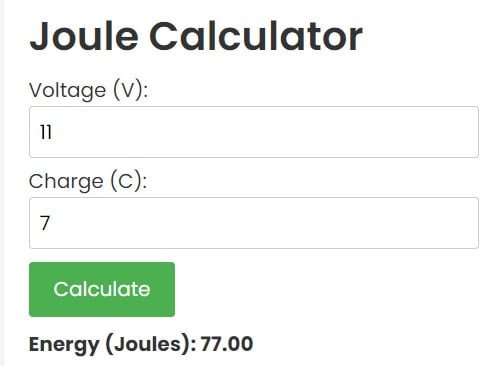In the world of physics, engineering, and even nutrition, the joule stands as a fundamental unit of energy measurement. Its versatility extends far and wide, from understanding the energy content of food to calculating the power output of mechanical systems. Today, we delve into the realm of joule calculator, exploring their significance, applications, and specialized variants such as the capacitor joule calculator and the airsoft joule calculator.
Table of Contents
Understanding Joule Calculators
At its core, a joule calculator simplifies the task of computing energy in joules. This tool proves invaluable in diverse fields, facilitating precise calculations without the need for complex manual equations. With the input of relevant parameters, such as force, distance, or electrical properties, users can swiftly obtain the energy content in joules, streamlining various analytical processes.
How to Use a Joule Calculator
Using a joule calculator is straightforward and user-friendly. Follow these simple steps to harness its power:
- Input Parameters: Begin by identifying the relevant parameters required for your calculation. These may include voltage, or capacitance, depending on the specific application.
- Enter Values: Enter the known values into the corresponding fields of the joule calculator. Ensure accuracy and consistency to obtain precise results.
- Calculate: Once all necessary parameters are entered, initiate the calculation process. The joule calculator will swiftly process the data and provide the energy content in joules as the output.
Example: Calculating Energy Stored in a Capacitor
Let’s consider an example to illustrate the use of a capacitor joule calculator:
Given:
- Capacitance (C) = 10 microfarads (μF)
- Voltage (V) = 50 volts (V)
Formula: The energy stored in a capacitor (E) can be calculated using the formula: E=1/2×C×V2
Calculation:E=21×10×(50)2=12,500joules
Exploring the Capacitor Joule Calculator
Capacitors, pivotal components in electronic circuits, store energy in an electric field. Calculating the energy stored in a capacitor involves understanding its capacitance and voltage. A capacitor joule calculator precisely performs this task, offering engineers and hobbyists a quick means to determine the energy stored within capacitors. By inputting capacitance and voltage values, users can effortlessly ascertain the energy in joules, aiding in circuit design and optimization.
Joule Calculators in Airsoft: Precision in Action
In the realm of airsoft, where accuracy and performance reign supreme, the airsoft joule calculator emerges as a vital tool for enthusiasts and professionals alike. Airsoft guns propel plastic pellets using compressed air or CO2, with energy output measured in joules. Balancing power and safety necessitates precise energy regulation, a task made simpler with dedicated airsoft joule calculators. These tools enable players to gauge the muzzle energy of their weapons, ensuring compliance with field regulations and enhancing the gameplay experience.
Practical Applications and Benefits
The utility of joule calculators extends beyond the realms of physics and engineering. In nutrition, these calculators aid in assessing the energy content of food, empowering individuals to make informed dietary choices. Additionally, joule calculators find utility in environmental science, facilitating energy-related computations in renewable energy systems and environmental impact assessments.
Leveraging Joule Calculators for Efficiency and Accuracy
Incorporating joule calculators into workflow processes enhances efficiency and accuracy across various domains. From optimizing electronic circuit design to fine-tuning airsoft weaponry, these tools streamline complex calculations, enabling users to focus on innovation and problem-solving. Furthermore, the accessibility of online joule calculators ensures widespread availability, empowering individuals worldwide to harness the power of energy computation.
Conclusion
In conclusion, joule calculators stand as indispensable tools in diverse fields, offering precision, efficiency, and versatility in energy-related calculations. From capacitor joule calculators aiding in electronic circuit design to specialized airsoft joule calculators enhancing gameplay experience, these tools exemplify the fusion of technology and practicality. Embracing the power of joule calculators unlocks a world of possibilities, empowering individuals to unravel the mysteries of energy with ease and accuracy.
FAQs
How do you calculate joules?
Joules are calculated by multiplying force by distance. The formula for calculating joules is:
E=F×d
Where:
- E represents energy in joules.
- F denotes force in newtons (N).
- d signifies distance in meters (m).
How is a joule calculator?
A joule calculator is a tool designed to simplify energy calculations by automating the process. Users input relevant parameters such as force, distance, voltage, or capacitance into the calculator, and it computes the energy content in joules based on the provided data. Joule calculators are available in various forms, including online tools, software applications, and built-in functions in scientific calculators.
How do you convert work to joules?
Work, measured in joules, is converted using the formula:
Work (in joules)=Force (in newtons)×Distance (in meters)
This formula represents the fundamental concept of work as the product of force applied over a distance. By multiplying the force exerted by an object in newtons by the distance over which the force is applied in meters, you obtain the work done in joules.
What is the formula for power in joules?
The formula for power, measured in joules per second (or watts), is:
P=E /t
Where:
- P represents power in watts (W).
- E denotes energy in joules (J).
- t signifies time in seconds (s).
This formula expresses power as the rate at which energy is transferred or converted over time.
What is 1 joule in physics?
In physics, 1 joule represents the amount of energy transferred or expended when a force of 1 newton acts on an object to move it through a distance of 1 meter in the direction of the force.
What is the unit of 1 joule?
The unit of 1 joule is defined as a combination of fundamental SI units:
- 1 joule (J) = 1 newton (N) × 1 meter (m)
This combination reflects the definition of the joule as the work done when a force of 1 newton is applied over a distance of 1 meter.


